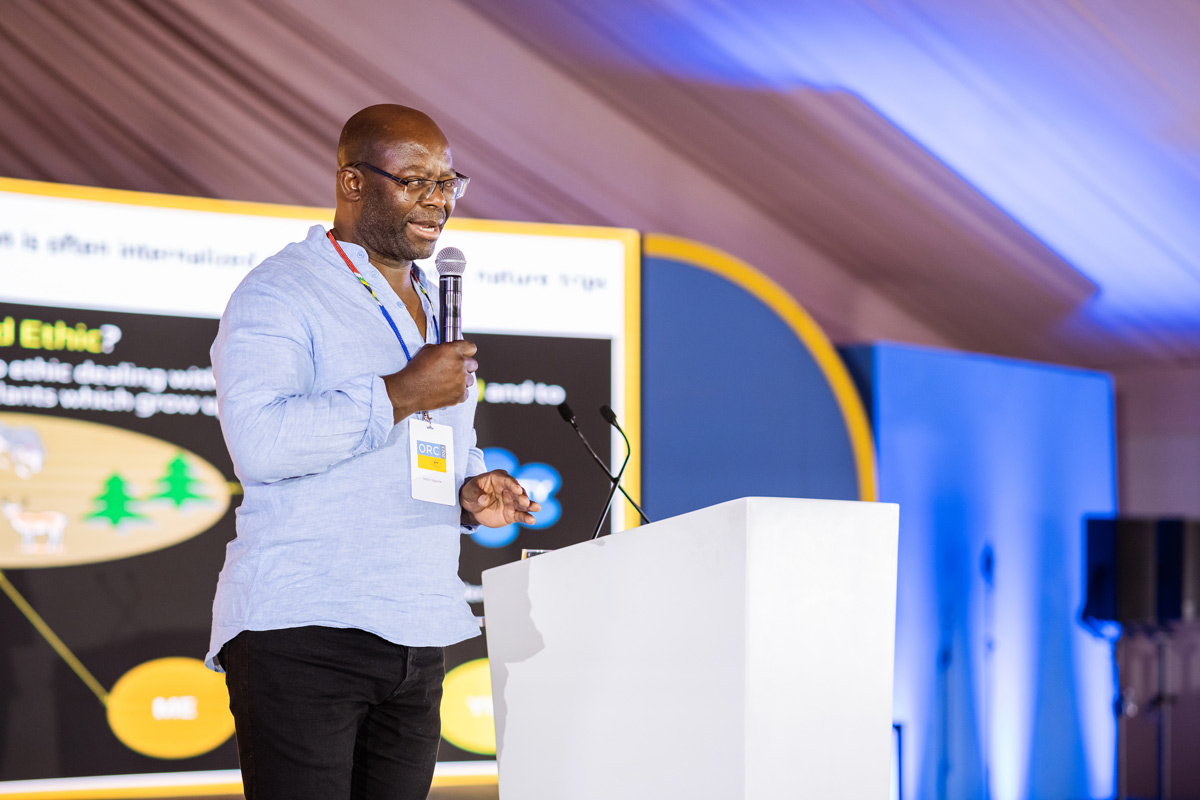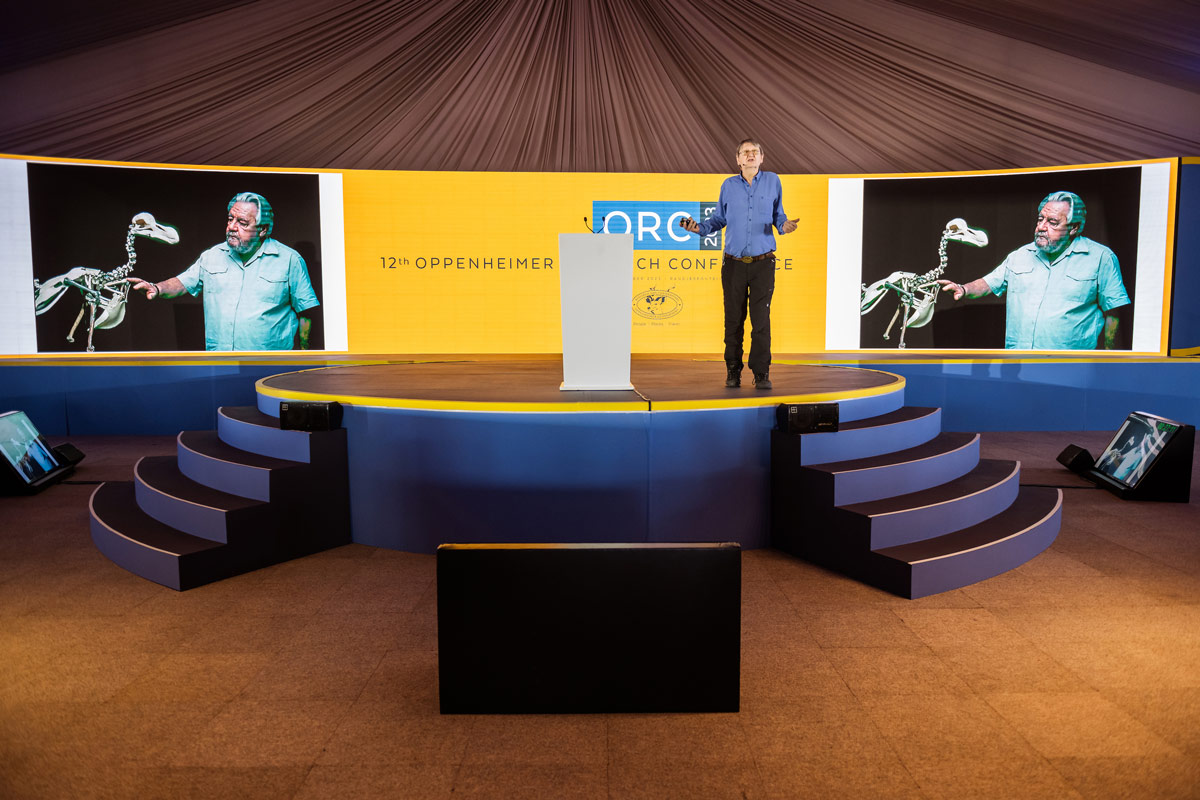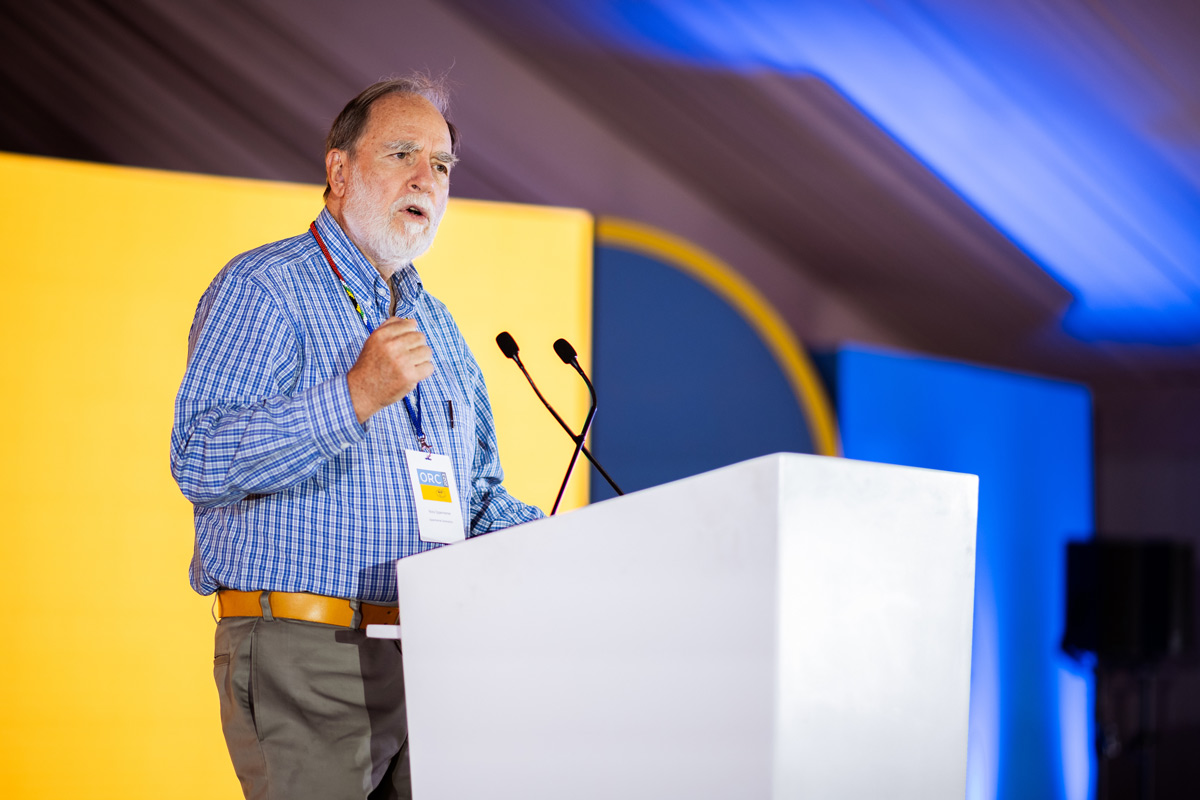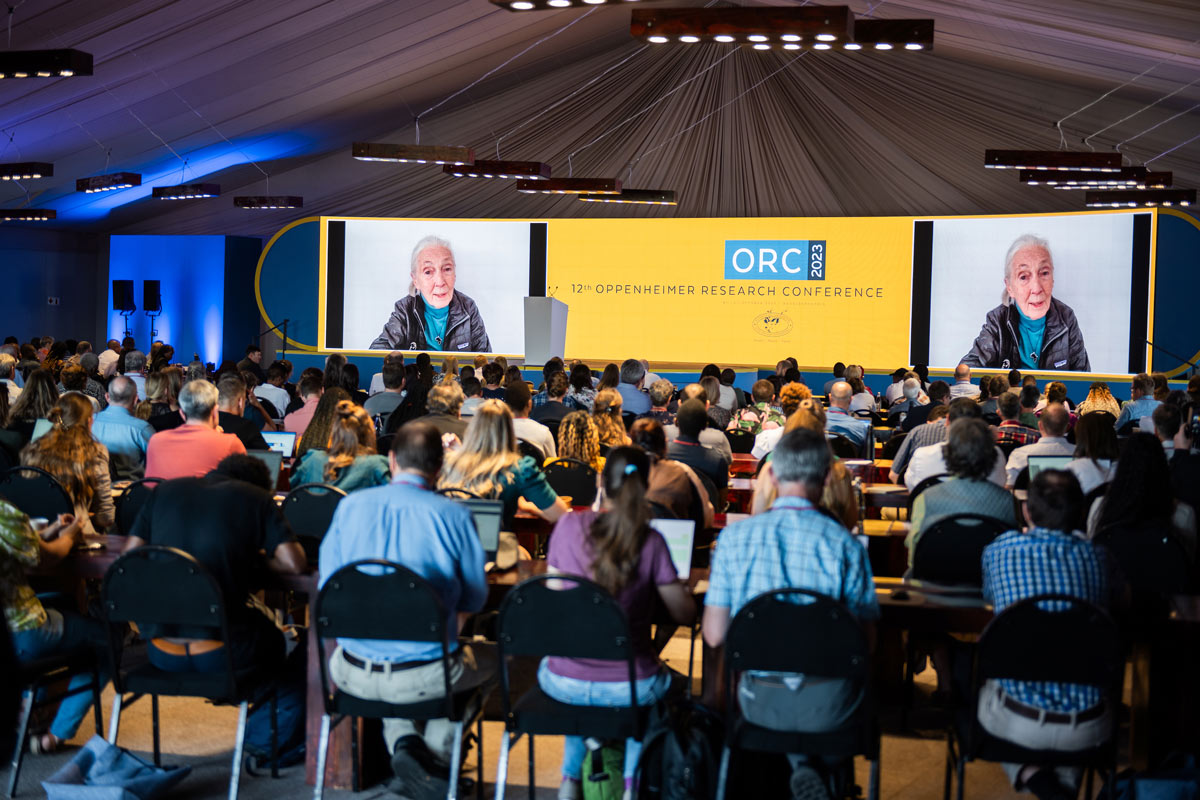A former SANParks conservation boss sounds the alarm on provincial game reserves. Matthew Hattingh reports
Many of South Africa’s cash-strapped and sometimes poorly managed provincial parks risk collapse and new ways must be found to sustain them. We can do this by learning from successes and failures elsewhere on the continent.
This warning and advice came from Hector Magome, former head of conservation at South African National Parks during the opening session of the 12th Oppenheimer Research Conference on Wednesday, 4 October 2023.
Magome was speaking to a gathering of around 420 experts, conservationists and scientists, meeting to discuss biodiversity and environmental research on the country, on the continent and beyond. The conference continues in Midrand until Friday, 6 October.
Also addressing the opening were Nicky Oppenheimer, who welcomed guests and delegates; International Relations and Cooperation Minister Naledi Pandor; celebrated ornithologist and conservationist Carl Jones; and the pioneering ethologist and conservationist Jane Goodall.

Sounding the alarm
Magome said: “There is a very high likelihood that in future we will only have South African National Parks (SANParks) and Cape Nature… mainly because they generate 80% to 85% of their own money.”
He feared that parks in the provinces “may finally collapse”, mentioning the unchecked grazing of cattle in some Ezemvelo KZN Wildlife reserves and the burning of a community-owned lodge in Mthethomusha Game Reserve by people from within the self-same community.
Magome quoted from a study by the Endangered Wildlife Trust and the Wildlife and Environmental Society of South Africa (on whose board he serves).
The study published earlier this year highlighted the many difficulties facing the parks. These included a lack of funds which meant four-fifths of budgets were spent on staff salaries; a dearth of conservation knowledge among senior staff; and political interference to the extent that it amounted to a “political takeover”.
Excluding SanParks and Cape Nature, he warned that “without good tourism income many provincial parks will collapse”.
However, there was hope for those provincial parks with strong tourism concessions, such as the Madikwe and Pilanesberg reserves, in the North-West Province.
Lessons from Africa
Magome said a number of the provinces were “keen to have the African Parks model” and needed support to achieve this and to establish partnerships with NGOs and the private sector. “We can work with the government and come up with some solutions.”
Johannesburg-headquartered NGO African Parks manages 22 parks and protected areas in 12 African countries. African Parks was co-founded by Mavuso Msimang, Magome’s former boss at SANParks, an ANC grandee, and a speaker at last year’s Oppenheimer Generations Conference.
Magome said the conservation models in practice in Malawi (where he worked for 18 months) and notably Namibia were worth emulating, however, he acknowledged both had their limitations.
Sustained engagement with communities, particularly those living near parks was a strong suit of the Namibian model, he said.
“There is no such thing as capacity-building of communities for three or five years, as many donor agencies would like… and then you leave. You want conservation to work with communities, you must be there for the long haul.”
He said Namibia worked well because NGOs and not-for-profits seemed “bonded forever” with communities.
On the other hand, in Botswana, “We have seen community programmes fail because the government was not interested in it. In fact, in one year, the government said, ‘Sorry, we don’t want them.’ And that was about that.”
Conservation in Malawi had been in a parlous condition, but then the “state admitted failure”, that it had no money, and showed wisdom to let NGOs and not-for-profits in as partners.
“Malawi was the capital of ivory trafficking and rhino horn trafficking. And within four years, it became a country of interest. We worked with the police to help them pick up the evidence. And we helped them go to court. And when somebody was convicted, there was a programme to manage and to monitor that they are doing time,” said Magome.
He contrasted this with the South African experience to its discredit.
“I’m involved in Madikwe Game Reserve. We arrest poachers, the next day they are out smiling, because there are no follow-up teams to go after international consumers and the big exporters. We don’t have a John Wick to get the bogeyman”, he said in reference to the fictional globe-trotting assassin.
He said the Department of Fisheries, Forestry and Environment, trumpeted the arrests of low-level figures in the poaching pyramid – which “does not change anything; they are easily replaceable”.
In the absence of a longer-reaching and more effective criminal-justice system, he suggested a shift in emphasis to helping rhinos breed, including in captivity, and shared with the conference a picture of a rhino and her calf gambolling on a sun-dappled hillside… at the San Diego Zoo.

Magome was energised by the potential for civic action and spoke about how private prosecutions could change the conservation landscape. He referred to a long-running case brought against BP by an advocacy group.
The Johannesburg High Court in April ruled that the petroleum company had built or upgraded 17 service stations in Gauteng without first obtaining the necessary environmental approvals.
The count is due to sit again from 6 to 8 November to consider sentencing.
Magome said he hoped a hefty fine would be imposed, with the prospect of 25% of it made available to fund conservation.
Approached for comment, Hamlet Morule, bp Southern Africa executive for communications and external affairs, said: “Given that this is an on-going legal process, we cannot at this time comment on that hearing or the case.”

Case for saving species
At the start of his talk Magome paid tribute to the leadership shown by Carl Jones, who had spoken earlier in the proceedings.
Also, a proponent of breeding critically endangered animals in captivity, Jones, told the conference about successful programmes he had helped establish in Mauritius which brought several critically endangered birds back from the brink of extinction.
Jones, of the Durrell Wildlife Conservation Trust, reminded delegates how Mauritius was a paradise before it was settled in the late 16th century.
He shared an early woodcut showing the rich flora and fauna diversity of the island – as well as how energetically the settlers set about exploiting it. Most infamously, the flightless dodo was hunted into extinction and many other species followed suit as eventually 98% of Mauritius’ natural forest cover was cleared.
Jones began work on the island in 1979 and has retained a conviction in the power of individual action and that “all species are savable”.
He detailed some of the painstaking work – and initial slow progress (“there are no quick fixes”) – he and his colleagues, including Mauritian volunteers, made over the years. This included saving the Mauritius kestrel, pink pigeon and Mauritius parakeet.
He acknowledged the effect of the world’s growing human population, the continuing onslaught of habitat loss, increasing pollution and threat of climate change to conservation efforts, but called on delegates to “embrace the challenge and move forward”.
“We cannot turn the clock back, but we can look forward to a sustainable and diverse world.
“You may say, ‘You are saving the odd species.’ But we have a massive crisis that results in the destruction of ecosystems. We find that species work saves ecosystems,” said Jones.
He spoke about his part in the heroic and continuing efforts to restore Round Island, part of the Mauritius Islands group.
Over many years this has involved everything from establishing plant nurseries in a dry landscape, to killing the alien rabbits which, along with goats, had denuded the island, to introducing exotic tortoises to control exotic grasses and seed natural vegetation with their droppings.
“We are still in the early stages, but we’re seeing the recovery of a wonderful island. This is a wonderful approach. And we believe in the future we can start rebuilding once-lost systems using ecological replacement in some cases. Yes, we can’t bring back the dodo. But we can bring back equivalents for other species.”
Jones called on scientists and conservationists to be creative.
“There are solutions, there is great hope. We need to look to the future. And we need to think about what we can achieve. Conservation works. And we can all make a difference.”
Protecting and restoring biodiversity
Jane Goodal, spoke about the critical importance of healthy ecosystems on which we all depended, and the reality that as “one species after another disappears, it will eventually collapse”. She challenged the “crazy belief” that economic development can continue despite finite resources, pollution and climate change.
“We are already in the sixth great extinction,” she said, telling how the Gombe forest, a once vast area when she had first arrived to study chimpanzees, had been reduced to a “small island”, surrounded by barren hillsides.
This was a consequence of population growth and poverty, she said, touching on a number of initiatives the Jane Goodall Institute and the Roots & Shoots programme were involved in to encourage sustainable farming and businesses, build schools and clinics and offer family planning.
She said they were listening to indigenous people, who “understand that protecting the environment is not just for wildlife but for saving the planet”.
Progress was being made, but we can’t afford to be complacent, said Goodall.
“We need to do much more. We need to collaborate and form partnerships. So that together, we can be even more effective in creating positive change.”

Call for practical solutions
Nicki Oppenheimer, welcoming delegates on behalf of non-profit organisation, Oppenheimer Generations Research and Conservation, echoed Jane Goodall’s “clarion call” for everyone, including researchers and conservationists across disciplines and sectors, to play a role in developing urgent and necessary solutions.
Minister Pandor warned that climate change, the loss of biodiversity and escalating pollution had put humanity on a precipice.
“In Africa, we urgently need to curb this threat… The challenges we face range from the poaching of iconic species, rare plants and threatened reptiles to the poorly regulated fisheries. We lack the resources, not only financial but the knowledge and capacity, to adequately protect the vast but threatened areas by land and sea.”
She praised the efforts of researchers who were helping to inform the government’s policies including the White Paper on the Conservation and Sustainable Use of South Africa’s Biodiversity.
“The White Paper emphasises the importance of research, science and partnerships and highlights the value of indigenous and traditional knowledge and practices providing localised solutions to biodiversity conservation and sustainable use,” she said, encouraging scholars to make such work a priority.
Turning to international relations, Pandor called on the scientific community to provide evidence for policy options and “swift, actionable solutions for decision makers”.
“Policy makers need detailed, rigorous, and practical answers on how we can mitigate and adapt to climate change,” she said. — Roving Reporters
• This article was commissioned by Jive Media Africa, science communication partner to Oppenheimer Generations Research and Conservation.













